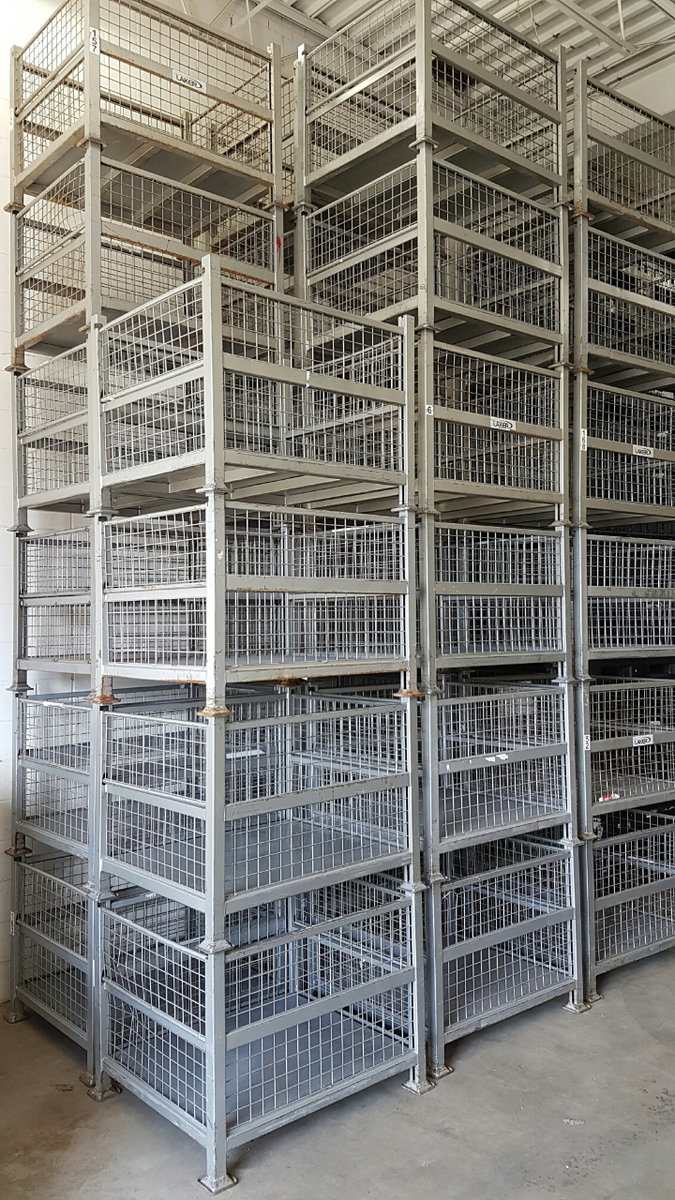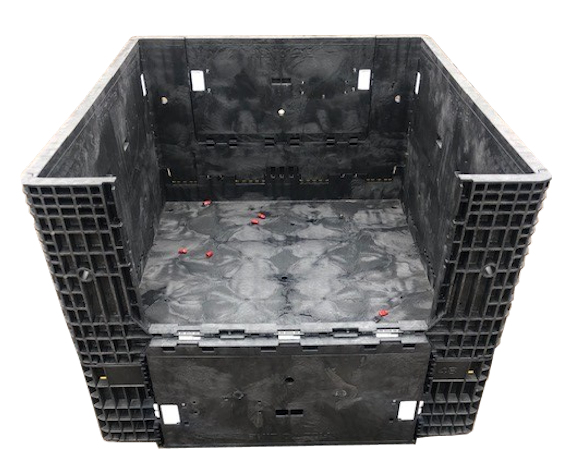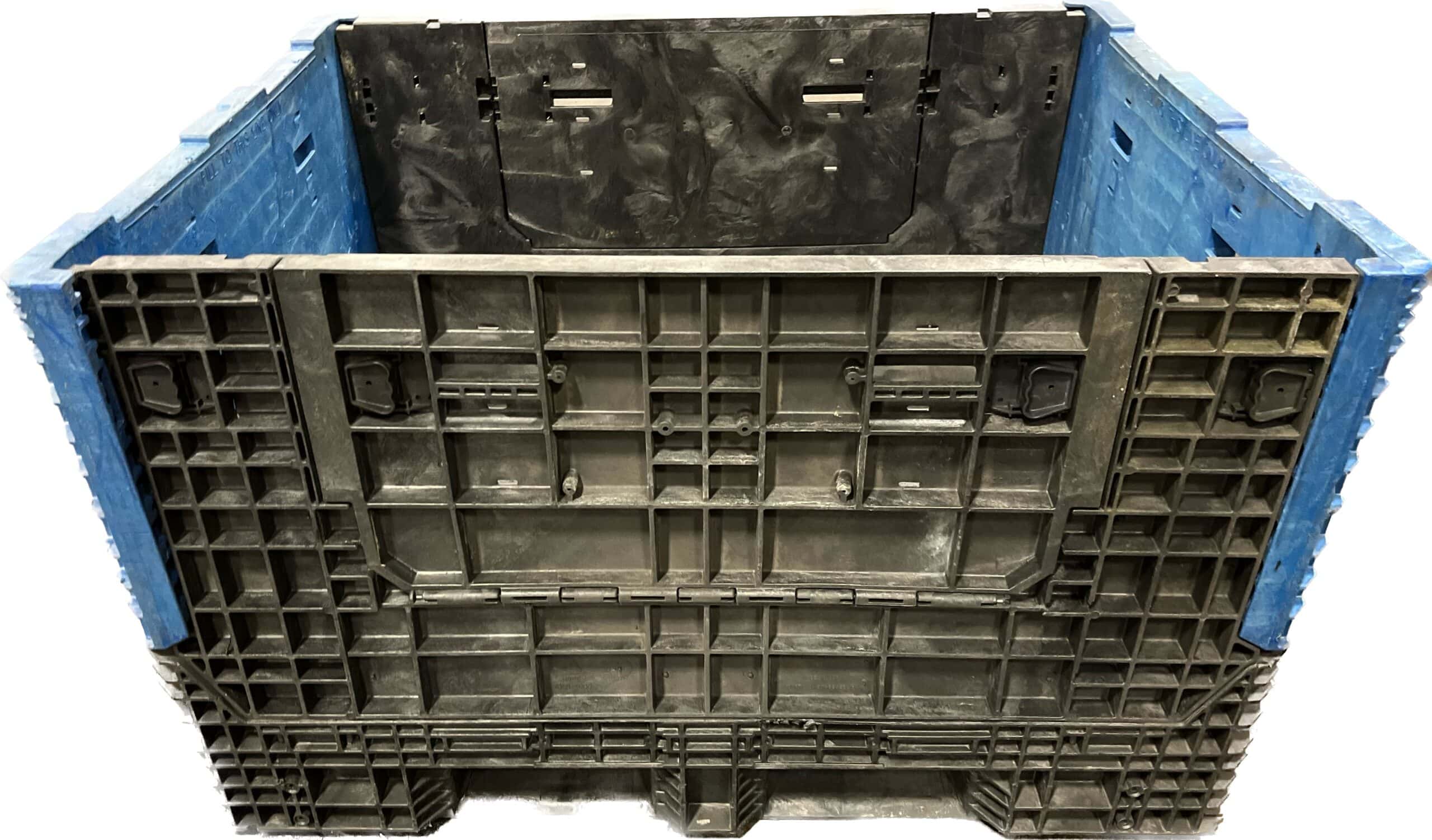Why Mass Containers Are Essential for Sustainable and Cost-Effective Transportation
Mass containers play a crucial role in contemporary logistics. They promote the reliable activity of huge amounts of products, thus optimizing transport procedures. This technique not only decreases costs but also reduces ecological influence via reduced exhausts and waste generation. As sectors look for even more lasting techniques, the fostering of mass containers is coming to be increasingly substantial. What effects does this change hold for future logistics and supply chain monitoring?

The Advantages of Utilizing Mass Containers in Logistics
Mass containers reinvent logistics by boosting efficiency and sustainability. These containers enable for the transportation of big amounts of items in a solitary trip, considerably decreasing the variety of trips needed. This not just enhances procedures yet also lessens labor prices connected with handling, packing, and unloading. In addition, bulk containers are created to maximize room utilization within transport cars, ensuring that even more products can be shipped at the same time.
The standardization of mass containers likewise streamlines the logistics procedure. With uniform dimensions, they can be quickly stacked and stored, bring about boosted stockroom management. Additionally, mass containers commonly include sturdy products that shield materials from damages throughout transit, thus reducing item loss and boosting general reliability. Consequently, organizations can experience boosted supply chain performance, ultimately resulting in enhanced success and customer contentment. This mix of elements makes mass containers a critical possession in modern logistics.
Environmental Influence: Minimizing Waste and Carbon Footprint
As industries significantly prioritize sustainability, the fostering of bulk containers has become a crucial technique for reducing waste and reducing carbon footprints. These containers reduce making use of product packaging materials, such as boxes and plastic, thereby significantly decreasing general waste generation. By consolidating shipments, mass containers enhance transport efficiency, enabling even more items to be delivered per trip. This decrease in trips directly associates with reduced greenhouse gas emissions, adding to a smaller sized carbon footprint.
In addition, mass containers can usually be recycled or reused, better alleviating ecological influence. The resilience of these containers assurances they can withstand several transportation cycles, reducing the requirement for single-use choices. refurbished bulk containers. By enhancing logistics and promoting efficient source use, mass containers not just sustain lasting practices but also encourage industries to line up with international environmental objectives. Inevitably, their execution mirrors a commitment to ecological stewardship and responsible resource monitoring
Price Cost Savings: How Bulk Containers Lower Transport Expenditures
While many firms seek means to boost their lower line, using bulk containers provides a significant opportunity for reducing transport expenses. Bulk containers make the most of the quantity of products moved, allowing services to ship bigger amounts simultaneously. This performance decreases the number of trips called for, straight reducing gas prices and minimizing labor expenses connected with loading and discharging.
In addition, mass containers commonly feature streamlined layouts that optimize room utilization within transportation cars. This means less voids, resulting in extra reliable use of offered capability. The durability of mass containers can reduce the danger of item damages during transportation, ensuring and minimizing losses that more products arrive intact.
Enhancing Supply Chain Performance With Mass Storage Solutions
Bulk storage space remedies play an essential function in improving supply chain efficiency by optimizing stock administration. By combining items right into fewer, larger containers, services can greatly minimize dealing with costs connected with constant transfers and handling. This structured strategy permits better tracking and management of supply, eventually resulting in improved operational efficiency.
Structured Supply Monitoring
Effective stock administration is vital for optimizing supply chain operations, specifically when companies embrace bulk storage space remedies. These solutions make it possible for businesses to keep higher stock degrees while reducing the frequency of replenishment. By settling materials into bulk containers, companies can improve their supply processes, reducing the intricacy connected with tracking numerous smaller sized plans. This technique promotes accurate inventory counts and boosts forecasting accuracy, enabling more informed decision-making. Additionally, mass storage space solutions simplify storehouse company, making it less complicated to locate and gain access to items when required. Consequently, organizations can accomplish a more efficient stock turn over rate, eventually improving general supply chain efficiency and reducing the chance of stockouts or overstock situations.

Reduced Handling Prices
The application of bulk storage space remedies not just enhances inventory administration however additionally considerably decreases taking care of expenses across the supply chain. By combining products right into bulk containers, business decrease the need for frequent handling and transfer in between various storage space and transport devices. This strategy reduces down on labor costs website linked with loading, unloading, and moving smaller packages. Furthermore, mass storage decreases the frequency of deliveries, leading to lower transportation costs and lowered fuel intake. Consequently, organizations can maximize their logistics procedures, permitting an extra reliable allowance of resources. Ultimately, reduced managing prices add to boosted total supply chain effectiveness, cultivating an environment that sustains both sustainability and economic stability.

Versatility of Mass Containers Across Various Industries
Although lots of sectors have distinctive demands for transport and storage space, bulk containers have actually become a flexible remedy that meets a large range of needs. These containers, varying from huge containers to specialized storage tanks, can accommodate diverse materials, consisting of powders, granules, and liquids. In the agricultural industry, bulk containers promote the transportation of plant foods and grains, while the food and beverage industry utilizes them for components and ended up items. The chemical market depends on mass containers for safely carrying dangerous materials, ensuring conformity with safety and security policies. Additionally, building firms profit from mass containers for moving aggregates and various other materials. Their adaptability extends to various modes of transportation, consisting of trains, vehicles, and ships, improving logistical performance. This versatility not just streamlines operations throughout various industries but additionally advertises sustainability by reducing product packaging waste and optimizing room en route. Mass containers play a vital function in contemporary supply chain management.
Future Patterns in Mass Container Usage and Sustainability
The future of mass container use is significantly shaped by innovative materials advancement that boosts sustainability. Furthermore, automation in logistics promises to enhance procedures, decreasing waste and enhancing efficiency. Embracing circular economic climate practices will better revolutionize just how bulk containers are created, utilized, and recycled, fostering an extra sustainable transportation landscape.
Innovative Products Advancement
As markets increasingly focus on sustainability, ingenious products development in mass containers arises as a substantial consider improving environmentally friendly transport solutions. Researchers and makers are checking out biodegradable plastics, recycled compounds, and light-weight steels to decrease environmental impact. These products not just minimize waste yet likewise boost gas performance by lowering the general weight of containers. Additionally, developments in wise products, which can adapt to differing conditions, improve the longevity and performance of bulk containers. The integration of these ingenious products lines up with round economy concepts, promoting reuse and recycling. As the need for lasting methods expands, the development of such materials will certainly play an important function in shaping the future of bulk container use in logistics and transportation.
Automation in Logistics
Substantial innovations in automation are poised to transform logistics and the application of mass containers, boosting sustainability in transportation. Automated systems, consisting of drones and autonomous vehicles, are improving the movement of mass containers, lowering the dependence on traditional fuel-powered transportation. These modern technologies enhance transmitting and packing procedures, enhancing and minimizing vacant miles fuel efficiency. Furthermore, automated supply administration systems improve monitoring and tracking of mass containers, guaranteeing better resource allocation and minimized waste. The combination of the Web of Points (IoT) allows real-time data analysis, making it possible for positive decision-making that lines up with sustainability objectives. As automation continues to develop, it is anticipated to drive further developments wholesale container usage, ultimately supporting even more lasting logistics methods and decreasing the ecological influence of transport.
Round Economy Practices
Innovations in automation are setting the phase for a much more incorporated strategy to round economic climate practices in the domain of bulk container use. As markets significantly accept sustainability, mass containers are being designed for durability and reusability. This change not just minimizes waste however likewise boosts source efficiency. Companies are taking on techniques such as closed-loop systems, where utilized containers are gathered, refurbished, and reintroduced right into the supply chain. Furthermore, clever technologies track container life process, assisting in better management and decreasing ecological influence. The partnership in between producers, logistics carriers, and end-users is vital in developing criteria for lasting container use. used collapsible containers. Future fads suggest a growing emphasis on products that are recyclable and biodegradable, more enhancing the round economy's principles wholesale transportation

Regularly Asked Inquiries
What Materials Are Mass Containers Typically Made From?
Bulk containers are normally created from sturdy materials such as high-density polyethylene, cardboard, steel, and light weight aluminum. These products supply defense, flexibility, and stamina, making them ideal for transferring different items in various markets successfully.
How Do I Pick the Right Size Bulk Container?
Choosing the best dimension bulk container includes assessing the quantity of materials to be moved, taking into consideration dealing with devices compatibility, and appraising storage room requirements. Proper dimension assurances effectiveness in transportation and lessens waste during shipment.
Are Bulk Containers Reusable or Recyclable?
Mass containers are usually multiple-use, made for several journeys, improving sustainability. Numerous can likewise be reused, relying on the products used. Picking recyclable alternatives even more minimizes and sustains environmental objectives waste in transportation methods.
What Security Rules Put On Mass Container Transport?
Security laws for bulk container transport consist of conformity with the Division of Transportation guidelines, appropriate labeling of hazardous products, structural honesty analyses, and adherence to weight limitations to guarantee safe handling and prevent mishaps throughout transportation.
Exactly How Can Services Shift to Utilizing Mass Containers Properly?
Businesses can alter to bulk containers by evaluating present logistics, educating staff on handling, investing in ideal tools, enhancing stock management, and teaming up with vendors to assure compatibility and efficiency throughout the supply chain.
As sectors progressively prioritize sustainability, the fostering of bulk containers has actually arised as a vital strategy for decreasing waste and reducing carbon footprints. By consolidating products right into mass containers, business can simplify their inventory procedures, reducing the complexity associated with tracking multiple smaller plans. As sectors progressively focus on sustainability, cutting-edge materials growth in bulk containers emerges as a substantial factor in enhancing environment-friendly transportation solutions. Automated systems, including drones and autonomous cars, are streamlining the movement of bulk containers, decreasing the dependence on traditional fuel-powered transport. Furthermore, automated supply monitoring systems improve monitoring and monitoring of bulk containers, ensuring much better source allocation and decreased waste.